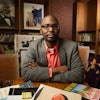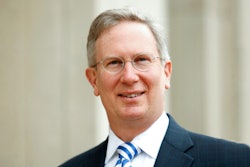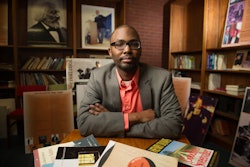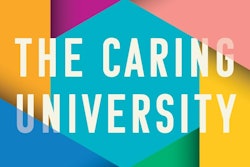MUSICMaking A Joyful NoiseTeresa L. Reed
 Title: Associate Professor of Music Theory
Title: Associate Professor of Music Theory
and Literature and Director, African American Studies Program, University of Tulsa
Education: Ph.D., Music Theory, Indiana University; M.M., Music Theory, University of Tulsa;
B.A., Music, Valparaiso University
Age: 40
Her friends, colleagues and even the critics agree: Dr. Teresa L. Reed is making a joyful noise in the world of music scholarship.
She’s rattling the rafters as a member of and sometime soloist with Higher Dimensions Choir, a Grammy- and Stellar-winning group led by the charismatic Bishop Carlton Pearson of Tulsa’s Higher Dimensions Family Church.
She’s raising the roof with her classes and lectures, where the timely topics she’s exploring — from Tupac Shakur and the early blues tradition, to Black women and opera, to “selling out” from the coon song era to today — have made her a hot ticket.
And most emphatically she’s making the sweetest of music in her writing. Her book The Holy Profane: Religion in Black Popular Music, recently won an ARSC Award of Excellence for best research in recorded rock, rhythm & blues or soul music. The ARSC, or the Association for Recorded Sound Collections, is an eclectic international association that includes collectors, dealers, archivists, historians and musicians of all stripes.
The honor came as no surprise to her colleagues.
“I would share the evaluation that she’s one of the 10 most outstanding scholars in the country,” says Dr. Frank Ryan, director of the music department at Tulsa and conductor of its symphony orchestra. “And I think her secret is that she continues to be a student in the best sense of the word. For instance, she’s started taking jazz piano. She’s never stopped learning.”
As for Reed, she says she simply considers herself blessed to be living her dream.
“I knew probably as far back as I can remember that I’d be doing something in music. I didn’t have a clue that it would be in academia — and for the longest time I had no inkling that I’d even like to teach. But my first musical experiences were in church, and I knew I’d grow old doing it,” she says.
Recalling those early, formative days in the close-knit, loving environment of the Church of God in Christ, Reed says, “If you know anything about COGIC, you know that we have very, very strict rules that govern lifestyle. And of course, high on that list of restrictions was secular music. You’d have an express ticket to hell if you dabbled in ‘the devil’s music.’
“But then there was also that contradiction in which all these great secular artists have emerged from the church tradition. That was something that was curious to me, something that I knew, as I grew as a scholar, that I wanted to explore,” Reed says.
Asked what drives her, Reed’s reply is both simple and moving: her family. She was one of five children in a family of modest means coming of age in the steel town of Gary, Ind. And when she went to college, she recalls being keenly aware of how many of the family’s resources were going to support her.
“I remember that first year that I needed an instrument, and it was $2,000. I might as well have asked my parents to buy me a yacht,” Reed says. “I don’t know what they did to manage it — they never told me — but when they bought me that instrument, I knew then that whatever I did, it was going to have to be impressive. I felt a responsibility somehow to pay them back.”
She discharges that responsibility in large part through her work with her students, advising them on matters practical — such as the importance of traveling abroad and learning a second language — and matters that are more, well, spiritual.
“The most important thing for me to impart to my students is simply this: pursue what you love,” Reed says. “I say to them, ‘Once you have found what you are passionate about and once you are possessed by that, that’s the happiest you are ever going to be in your life.'”
— By Kendra Hamilton
© Copyright 2005 by DiverseEducation.com


















